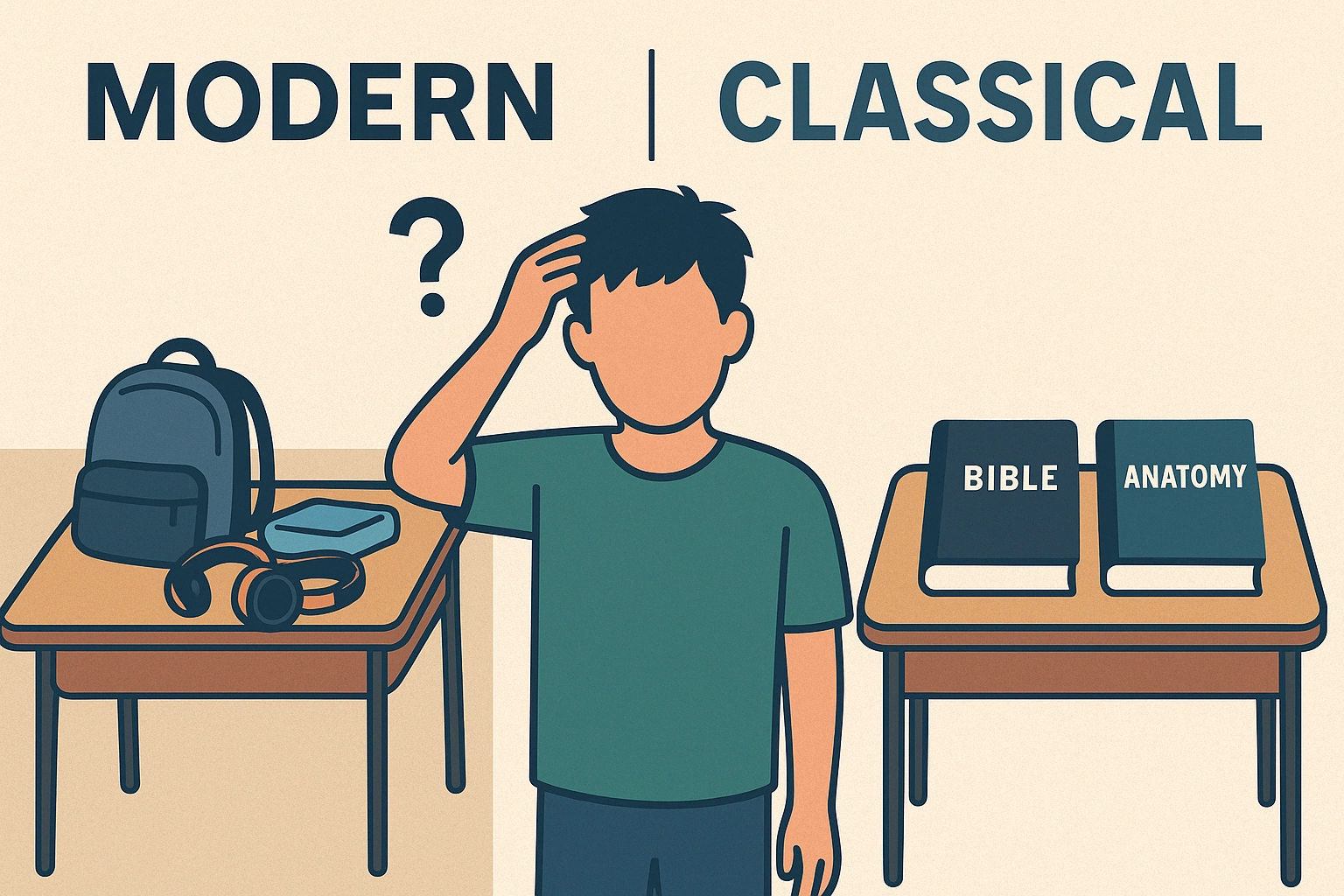
Recovering a Lost Vision of Education
Modern education has become increasingly fragmented, with students learning disconnected facts across unrelated disciplines. But education is not a warehouse of content—it is the formation of a person. Classical education restores the unity of knowledge by emphasizing the interconnectedness of subjects under a coherent vision of truth. At Virtualis, students don’t simply memorize—they understand. They don’t merely pass—they are formed. Our curriculum is rooted in wonder, guided by virtue, and shaped by the wisdom of centuries. Rather than preparing students for the next test, we prepare them for the rest of life.
This recovery of classical learning brings intentionality back into every subject. Literature is taught not just for analysis, but for moral insight. History is not a list of names and dates, but a living conversation. Science becomes a study of order and design, not a disjointed stream of facts. Math is a path to clarity and beauty. The result? Students learn to love learning—not for a grade, but because they see how knowledge points toward meaning. This is not nostalgia. It’s renewal.
Virtue as the Foundation for Lifelong Success
What good is knowledge without character? Classical education doesn’t just inform the mind—it forms the soul. Our students are taught that true success is not measured by titles, but by integrity. Through daily habits, great stories, and high expectations, they are trained in the classical virtues: courage, temperance, wisdom, and justice. These are the virtues that make leaders trustworthy, employees dependable, and citizens honorable.
Today’s world is increasingly chaotic, relativistic, and driven by emotional reaction. In this environment, students need more than technical skill—they need moral clarity. Our graduates are prepared to lead not because they are the loudest, but because they are the most grounded. Whether they pursue medicine, law, ministry, or trade, they carry with them a compass: a worldview shaped by truth, virtue, and responsibility. In forming students to become virtuous men and women, we do more than help them succeed—we help them flourish.
A Curriculum That Forms Thinkers, Not Test-Takers
In the classical tradition, education is a journey of the mind—a training in how to think clearly, speak persuasively, and live wisely. At Virtualis, students learn grammar, logic, and rhetoric—the classical trivium—as a progressive and transformational framework. These disciplines are not archaic; they are powerful. Grammar teaches structure and precision. Logic teaches analysis and discernment. Rhetoric teaches communication with truth and grace. Together, they build the intellect and shape the whole person.
Our students don’t just consume information; they wrestle with great ideas. They read Plato, Shakespeare, and Austen. They argue from reason. They encounter real philosophy, real history, and real literature. Instead of regurgitating facts, they are taught to evaluate arguments, trace worldviews, and engage with beauty. In doing so, they become discerning thinkers—able to detect fallacies, withstand cultural confusion, and seek truth with confidence. In an age of noise, they learn how to listen, and more importantly, how to speak with clarity and courage.
Prepared for College, Career, and Calling
Parents often ask: will classical education prepare my child for the real world? The answer is a resounding yes—because classical education does more than check academic boxes. It cultivates the habits of thought and character that are essential for success in any field. From medicine to marketing, engineering to entrepreneurship, the ability to read closely, write clearly, speak persuasively, and think logically is in high demand.
At Virtualis, our students develop these skills through an integrated curriculum that emphasizes deep reading, analytical writing, respectful debate, and moral reflection. They don’t just take in information—they evaluate it. They don’t just recite—they reason. They learn to ask better questions, to listen carefully, to articulate their convictions, and to work with excellence and integrity. These are the very traits that college admissions officers and employers consistently name as top priorities—and they are the natural fruit of a classical formation.
But we go further still. Through our unique partnership with the Vitae Formation Program and integrated telehealth offerings, our students also gain a strong foundation in wellness, purpose, and whole-person development. We prepare students not only to succeed in their careers, but to answer their calling with courage and clarity. Classical education isn’t just a better academic model. It’s a better human model—because it forms people who are free to pursue truth, serve others, and lead lives of meaningful contribution in any arena they choose.
Why Parents Choose Classical Education
Parents today are hungry for something more. They want their children to be well-educated, but also well-formed. They want academic rigor, but also moral clarity. They want truth, beauty, and meaning—not just utility. Classical education delivers all of this and more.
Critical Thinking Over Test Cramming
Our students don’t memorize to forget. They are taught to ask deep questions, challenge assumptions, and seek wisdom. They graduate ready to think independently in college, career, and life.
Whole-Person Formation
We don’t separate the intellectual from the moral or the physical. We form children in mind, character, and health through integrated curriculum, mentorship, and family partnership.
Prepared for Every Profession
From STEM to law to ministry, classical education forms leaders. Our graduates are articulate, reflective, and resilient—capable of adapting and excelling in any field they choose.





